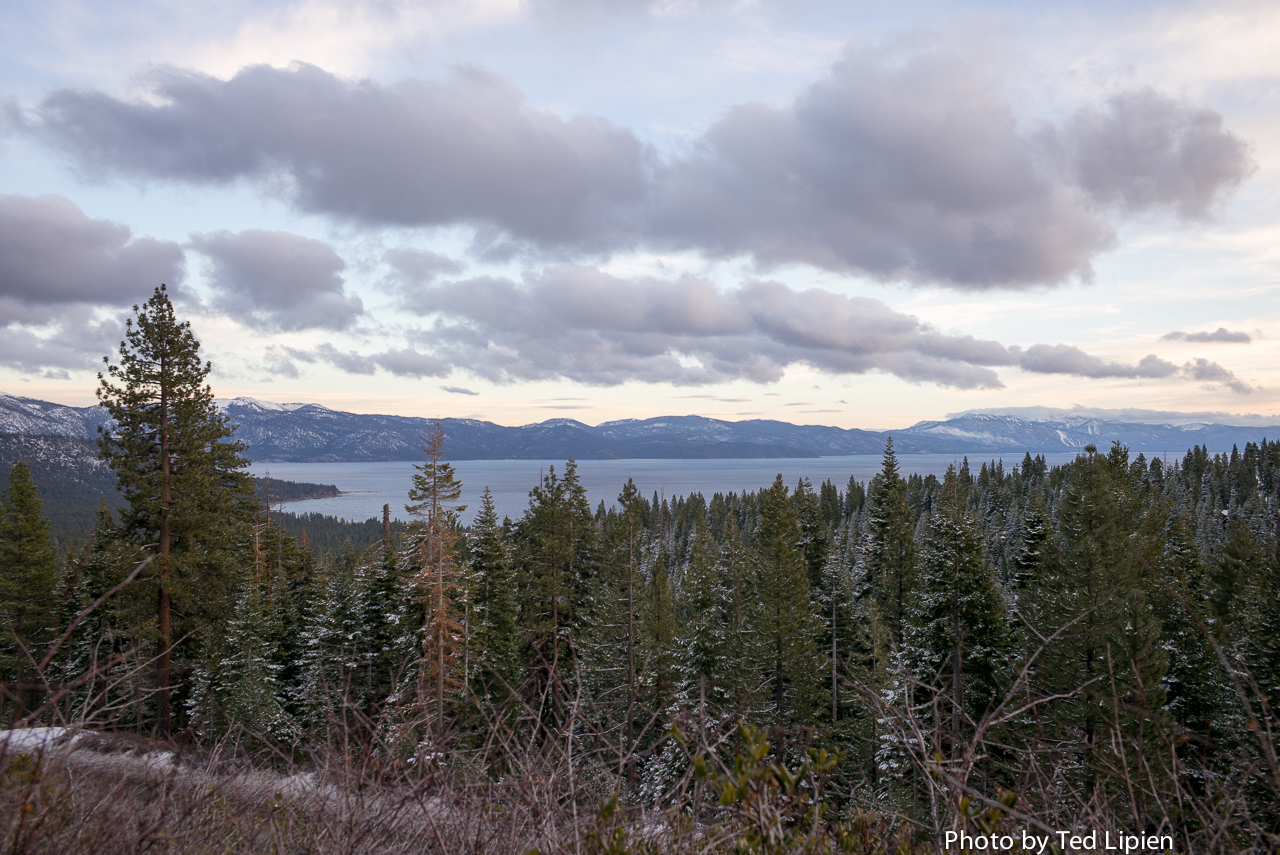Owning It by Prudy Grimes
The first time my husband and I drove over Brockway Pass and saw Lake Tahoe, tears came to our eyes. It was the most beautiful place we’d ever seen. That was ten years ago, and we live here now. We are nomadic academics, who have travelled and lived all over, but neither of us had ever seen anything like this.
We both had jobs in Pittsburgh, Pennsylvania. I taught writing at the University of Pittsburgh, and my husband still holds a professorship in Theoretical Physics at Carnegie Mellon University. Pittsburgh worked for us. We never loved it, but we lived and thrived there. Blessed with a sylvan beauty, Pittsburgh offers hiking, whitewater kayaking, skiing in mountains less than an hour drive from downtown, a huge system of parks running through the city. It should be wonderful, but environmentally it’s ruined. Though the smoky days of steel mill air pollution are in the past and most of the iconic buildings have been scrubbed clean, the place will always suffer from the kind of pollution that lingers, impossible to clean up.
The riverfronts could be turned into marinas with walks and bikeways, but the arsenic and mercury left behind by the mills lingers on, making miles of waterfront property uninhabitable. It’s too expensive to clean up.
The ruin of this beautiful area has become even more tragic thanks to a governor who allowed hydraulic fracturing for natural gas locked in the shale layers that underlay this region to run rampant. Fracking became the final environmental nail in the coffin of Southwestern Pennsylvania. Now you aren’t supposed to drink the water.
To my mind, the real culprit is the mindset of the people who grew up there. The mindset of “the whole place is garbage, so who cares about litter? Who cares about trying to clean up the city and pick up the trash along the roadsides?”
We lived out of the city in the hills and forests of the countryside. Every spring when the last of the dirty snow melted away, the trash littering the hills before the grass grew in to cover it made us angry, disgusted and sad. How could people who had called this area home for generations care so little? Daily we witnessed people flicking cigarette butts out of cars, and throwing plastic shopping bags on the ground the minute they walked out of a convenience store.
Pittsburgh suffers from an inferiority complex. “We’re a beer and a shot kind of town, not a brie and Chablis kind of place.” I heard that over and over, always said proudly. But does that working class pride of place have to turn into such a lack of stewardship? In the winter, we’d head into the mountains for cross country skiing, along streams, and among old growth hemlock groves. The peace and the beauty of the place made you forget the ruin, until invariably we’d come to a place where someone had spray painted on the towering rocks along the path, “I love nature.”
The reason why I’m thinking about Pittsburgh now that I’m living in Tahoe, a place abundantly blessed with what still feels to me like a pristine beauty, is that after living in Pittsburgh I realize how fragile this area is. Reckless building practices, unplanned, or poorly planned drainage of a new housing project, and we’re on our way to being another Pittsburgh. It only takes one politician willing to allow fracking, or it’s equivalent, and not enough resistance to stop him or her, and the Tahoe basin becomes another once beautiful ruined place. Get complacent about the yearly clean up of spray paint on the rocks at Bonsai Beach, and we’re on the road to “I love nature,” spray painted in the middle of old growth hemlocks.
Of course the Tahoe basin is not Pittsburgh. But Pittsburgh started out as a region with almost as much natural beauty as the Tahoe basin. People moved in and wanted to exploit what was beautiful and lucrative, and the people who lived there, being poor and in need of a cash infusion, allowed it to happen. And now it’s ruined.
It could happen here. Look at the bike racers who come in with a total disregard of the people who live here, tossing along the roads their water bottles, their punctured inner-tubes and the silly bobble things they wear on top of their helmets, or the builders who want to raze mountaintops to put in yet another enclave for the super rich. Individual acts we can most likely rectify; we cannot so easily rectify a mindset, a cultural viewpoint, once it takes hold, that sees our beautiful, wild place in the world not as precious or fragile or pristine, but as a commodity available for exploitation. Maybe for the builders, the prospective profit makes it’s easy to justify more growth, more buying their way into areas that should be protected for future generations, to maybe forget what a fragile place the Tahoe basin is. It’s up to all the rest of us to remain cognizant of how hard we need to fight to protect it. We have to own both the area and the fight.
Prudy Grimes (prudygrimes.com) is a writer living in the Lake Tahoe area. Her stories have appeared in North American Review, Fiction International, Other Voices, and other literary journals. This is her first article for EcoTruckee.org. Her locally-based mystery novel, “The End of Snow,” about a murder in Squaw Valley, will be published in 2015.



Leave a Reply